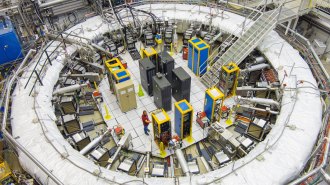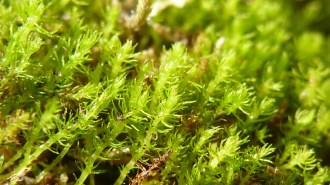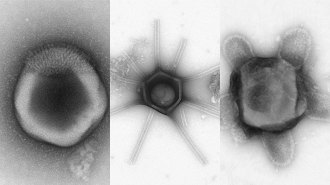Uncategorized
-

-
 Particle Physics
Particle PhysicsThere’s a new measurement of muon magnetism. What it means isn’t clear
The measurement, from the Muon g−2 experiment, is the most precise yet. But recent theoretical predictions are a bit muddled.
-
 Paleontology
PaleontologyMeet the tiny ancient whale named after King Tut
The newly discovered Tutcetus rayanensis lived about 40 million years ago. It was just 2.5 meters long and weighed less than 200 kilograms.
By Skyler Ware -
 Astronomy
AstronomyMeet Jane Rigby, senior project scientist for JWST and advocate for LGBTQ+ astronomers
Rigby, senior project scientist for the James Webb Space Telescope, believes being part of the LGBTQ+ community has made her a better astronomer.
-
 Plants
PlantsThe fastest-evolving moss in the world may not adapt to climate change
The genus Takakia has the largest number of fast-evolving genes of any moss, a study finds. But it’s losing ground in the warming Himalayas.
-
 Climate
ClimateExtreme ocean heat off Florida has ebbed. But for marine life, the danger remains
After the recent heat wave, corals have received too much heat too early in the summer, and other sea life could see lingering effects too.
-
 Genetics
GeneticsThe ‘unknome’ catalogs nearly 2 million proteins. Many are mysterious
Scientists have unveiled a new database that emphasizes how much we still don’t know about human proteins and genes.
By Skyler Ware -
 Astronomy
AstronomySpiral galaxies might have been lentil-shaped before becoming starry whirls
By using black holes to track how galaxies merge and grow, an astronomer has proposed an update to the prevailing story of how galaxy shapes evolve.
By Elise Cutts -
 Earth
Earth50 years ago, mysterious glass hinted at Earth’s violent past
Like Hansel and Gretel followed a trail of breadcrumbs, scientists have followed tektites to the sites of major meteorite impacts.
By Demian Perry -
 Climate
ClimateExtreme heat taxes the body in many ways. Here’s how
Climate change is bringing longer, humid heat waves and hotter nights. Here's how our bodies try to beat the heat and what happens when they can't.
-
 Life
LifeA fantastical world of potential giant viruses lurks beneath the soil
Giant viruses were already known for their large sizes. A close look at a scoop of soil shows that they may come in a variety of funky shapes as well.
By Meghan Rosen -
 Health & Medicine
Health & MedicineClimate change puts children’s health at risk now and in the future
Heat waves, wildfires and other climate-related effects on the environment are particularly hard on children’s physical and mental health.